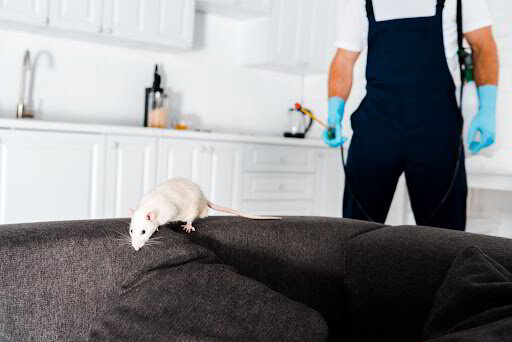Rodents are more than just an inconvenience. They damage property, spread disease, and can cost businesses thousands in lost revenue, fines, and reputation damage. Whether you run a restaurant, warehouse, or office, keeping rodents out in the first place is far more effective (and cost-efficient) than dealing with an infestation. But how do you actually prevent them from becoming a problem?
Why Rodents Are a Bigger Problem Than You Think
It’s easy to assume that seeing a single rat or mouse isn’t a big deal. But rodents breed rapidly, and where there’s one, there are usually more. A single female mouse can produce up to 60 offspring per year, and rats aren’t far behind. Once they’ve settled into your property, they’ll chew through wiring, contaminate food, and even spread diseases like salmonella and leptospirosis.
But beyond the physical damage, a rodent sighting can be disastrous for businesses. Restaurants and food-related industries face strict health regulations, and a single inspection failure can lead to hefty fines or even closures. Offices and warehouses aren’t safe either—rodents can gnaw through cables, causing expensive electrical failures or even fire hazards.
The Real Cost of Waiting Until You Have a Problem
Rodent control is something you should consider before you notice any signs of an issue. Many businesses don’t take action until they see clear signs of a rodent problem—droppings, chewed wires, or even the rodents themselves. But by the time you notice them, the damage is already done. You’re now looking at:
- Expensive extermination costs – A full-scale rodent infestation requires professional extermination, which is significantly more costly than prevention.
- Property damage – Rodents don’t just chew wires; they damage insulation, pipes, furniture, and even structural elements.
- Lost revenue and reputation – Customers won’t return to a business that has a rodent problem. Even worse, one online review mentioning rats can deter future business.
- Health and safety violations – Fines from health departments or regulatory bodies can add up quickly, and in some cases, businesses may even be forced to shut down.
The key takeaway? Prevention is not just about avoiding a rodent sighting—it’s about protecting your bottom line.
How to Keep Rodents Out of Your Business for Good
So, how do you stop rodents before they become a problem? It comes down to denying them access, food, and shelter.
1. Seal Every Possible Entry Point
Rodents can squeeze through shockingly small gaps—mice only need a hole the size of a dime, while rats can fit through anything as small as a quarter. Inspect your building for any openings and seal them with materials rodents can’t chew through, such as steel wool, concrete, or metal flashing. Pay special attention to:
- Cracks in walls and foundations
- Gaps around doors, windows, and utility pipes
- Air vents and drainage pipes
Regular inspections are key because even small structural shifts can create new entry points over time.
2. Cut Off Their Food Supply
Rodents like mice don’t stick around if there’s nothing to eat. Businesses, especially those dealing with food, need strict sanitation measures to eliminate easy meals:
- Store all food in airtight containers – Even in office kitchens, an open bag of snacks can attract rodents.
- Empty trash bins daily – Use bins with tight-fitting lids, and don’t let garbage pile up.
- Clean up spills immediately – Even small crumbs can sustain a rodent colony.
For warehouses and storage facilities, ensure packaged goods are off the ground and at least a foot away from walls—this makes it harder for rodents to nest.
3. Remove Nesting Areas
Rodents love cluttered spaces where they can build nests undisturbed. Reducing their hiding spots makes your business far less inviting:
- Keep storage areas organized – Cardboard boxes and piles of paper are ideal nesting spots. Use plastic containers instead.
- Trim vegetation around the building – Overgrown plants and bushes provide cover for rodents trying to get inside.
- Fix leaks and moisture issues – Rodents need water, and damp areas are ideal nesting spots.
Regular cleaning and maintenance can go a long way in making your property inhospitable to rodents.
4. Schedule Routine Pest Control Inspections
Even if you haven’t seen a single sign of rodents, regular pest control inspections are a must. Professional pest control experts can:
- Spot early warning signs before an infestation starts
- Identify weak points in your building’s defenses
- Provide tailored prevention strategies for your industry
Think of it as insurance—you wouldn’t wait for a fire to install smoke detectors, so why wait for an infestation to bring in the professionals?
Why Businesses Need a Long-Term Prevention Plan
Rodent control isn’t a one-time fix—it’s an ongoing effort. Businesses that stay ahead of the problem follow these best practices year-round:
- Quarterly property inspections – Even if no rodents are spotted, regular checks prevent new vulnerabilities.
- Employee training – Staff should know the signs of rodent activity and how to prevent them.
- Strict sanitation protocols – Keeping food areas clean should be standard practice, not just an occasional effort.
- Immediate action on sightings – If a rodent is seen, don’t wait—bring in pest control right away.
Proactive businesses don’t just avoid rodent problems—they eliminate the risk of having one in the first place.
Prevention Now Saves Money Later
Rodent problems aren’t just about the unpleasant sight of a rat or mouse—they can lead to serious financial and reputational damage. The good news? You can prevent infestations entirely with the right approach. By sealing entry points, eliminating food sources, reducing nesting areas, and investing in routine pest control, businesses can stay rodent-free without the stress and cost of emergency extermination.
The choice is simple: pay a little now for prevention, or pay a lot later for an infestation. Which would you rather do?


![7 Best POS Software in the UK [2026 Edition]](https://todaynews.co.uk/wp-content/uploads/2026/02/7-Best-POS-Software-in-the-UK-2026-Edition-360x180.png)








































































